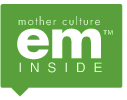What Is Probiotic Composting and EM ?
Why Compost ?
Two reasons : To be environmentally responsible, and also to enhance our quality of life by improving our gardens, food and ecology.
Reconnecting our waste back to the soil (the way nature has done things for millions of years) will regenerate soil fertility and help us grow food of great nutritional value.
Consider how about 30-45% of domestic waste is organic matter.
People think inorganic waste is the only problem, but organic waste unfortunately causes huge environmental problems when it is put in landfill sites.
Along with segregating and recycling our non-organic waste, we need to find a way of dealing with the organic matter.
Now the problem with simply throwing it in a normal compost bin or heap is its filthy and stinky - it creates flies, maggots, attracts rats, produces methane and ammonia. All that potential nutrient and mineral energy in the food is lost.
This is because the organic matter in these conditions is putrefying under pathogenic bacteria processes. However, consider how, with the application of natural microbes, the degrading process can be guided toward one of fermentation - like the way yogurt, cheese, soysauce and saukraut is made.
Fermenting the matter removes all the problems of pathogenic bactera and greenhouse gasses and disgusting smells from the process, simply by the addition of 'bokashi' (malted bran) into a specially designed anaerobic bucket.
The fermented matter produces abundant amounts of nutrients and antioxidants which revitalise soil, passively impart health to organisms and may well be the way toward a high yield organic agriculture, once the interconnectivity between this domestic resource and bioregional food production is made.

The difference between Fermentation and Putrefaction
There are also many anecdotes from Japan where the technology originated and has gone broadband about quite amazing wildlife regeneration from the use of this method. The probiotic (em, kyusei) method goes way beyond compost, this is actually a regenerative system that can help heal ecosystems and change the way we interact with the earth.
The class of technology that probiotic composting fits under is 'bioremediation'.
Why Do I Keep hearing the term "EM" on this site ?
The probiotic mixture used to make bokashi and turn food waste into super-soil is sometimes known as 'EM', 'efficient microbes/effective microorganisms' or 'probiotics', refering to a mixed microbial culture of selected species of microorganisms such as lactic acid bacteria, yeasts, photosynthetic bacteria and actinomycetes. All of these are natural, non-gm, and mutually compatible with one another and coexist in liquid culture.
When applied straight to soil as an inoculant, these microorganisms function cooperatively to exert beneficial effects on soil quality. Some of the microorganisms in EM are known to produce bioactive substances such as vitamins, hormones, enzymes, antioxidants and antibiotics that can directly, or indirectly enhance plant growth and protection.
It has also many uses for environmental applications such as silage treatment, septic tanks, animal husbandry, hygiene, and medicine. Explore the site to learn more.
How do I get started with Probiotic composting ?
Everything you need to get going is on this site !
From the store you can purchase many supplies including :
* Kitchen Waste Digester (for
household food waste recycling)
* EM-liquid culture (beneficial microbial
brew)
* Bokashi (EM based compost starter)

| Healthy Soil Symbiotic relationship of beneficial microorganisms |
Diseased Soil Pathogenic microorganisms dominant |
Click here to go to article page for more information
on soil microbiology and nature farming

